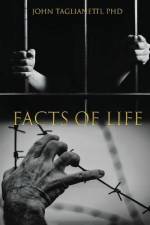Bøger af John Taglianetti
-
158,95 kr. History is a record of past events. It is a systematic account of people and events. History must be accurate. Historians use guidelines to research and write History. It should be written with a neutral point of view. All aspects of the historically significant individual must be researched, evaluated, verified, and placed into the perspective of the time it occurred. Most importantly, the events should be accurate and truthful. This book is more Historical Revisionism than History. My view is neither neutral nor secondhand. However controversial and outrageous the recorded events may appear, they are, in fact, True! The truth, of course, is not only an adequate defense but also the purpose of my writing.John is a lifelong academic and professional author, publishing three non-fiction volumes. He began his career as a researcher at CBS-WCAU TV as director of Research; followed by high-level government positions in Philadelphia politics. Namely; Executive Assistant to the Mayor of Philadelphia from 1970-1980, where he continued writing position papers, background investigations, speeches, and political research. He left that position in 1980 when he became the executive assistant to the Chairman of the Senate Appropriations Committee and was followed by managing the campaign for the incumbent Philadelphia District Attorney. During his entire career, John graduated from five different graduate schools obtaining 3 master's degrees and dual Ph.D. degrees in Psychological Research and also Forensics. John continued his love of knowledge and today does pro-bo work as a behavioral psychologist in the Pennsylvania prison system, where he authored his latest work entitled "Facts of Life," which is a non-fiction volume depicting the narratives of adjustment and adaptation older males serving life sentences published 2022.John lives in Ambler Pennsylvania, with his wife of 52 years and his four married daughters and 10 grandchildren.
- Bog
- 158,95 kr.
-
178,95 kr. This short book is all about the lost opportunity of men sentenced to life in prison. For these men, the only way out is to die in prison, which I call "toe tag parole." The option of commutation is a possibility, except that it rarely occurs in Pennsylvania. Why are commutations so rare? While some state legislatures constrained or eliminated parole in the 1990s, in most states, the parole board still has enormous power to offer second chances to incarcerated people. But most parole boards-including for many years, Pennsylvania's and Connecticut's-have refused to do so. As the criminal justice scholars Kevin R. Reitz and Edward E. Rhine note, parole board members are risk-averse political appointees with little job security. "Members or entire boards," they write, "have been forced to resign after a single high-profile crime committed by a released prisoner." Typically, parole boards are most hostile toward those who have committed crimes of violence, often refusing to consider anything other than the offense itself during rote hearings as they relitigate the offenses that morph into decades of denials.That is why it matters so much that the nation's parole board should begin to chart a new course. More than 50% of people in state prison are serving sentences for violent crimes. We will never end the scourge of mass incarceration if we write off this group. Because decades of research have proved that older people are rarely violent, extremely long sentences can almost never be justified on public safety grounds. And because some incarcerated people have found ways to change and thrive in conditions few of us could tolerate, the system should have pathways that recognize their efforts and reward them with paroles.
- Bog
- 178,95 kr.


